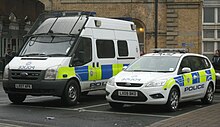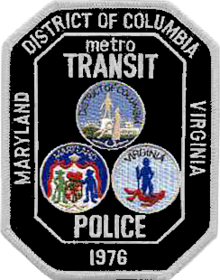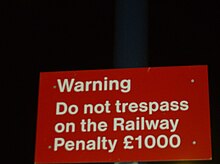Transit police
This article has multiple issues. Please help improve it or discuss these issues on the talk page. (Learn how and when to remove these template messages)
|

Transit police (also known as transport police, railway police, railroad police and several other terms) are specialized
.Transit law enforcement services may also be provided by a specialized unit within a larger local law enforcement agency. Their mandate is generally to prevent and investigate all crime committed against the carrier or its passengers and crime incidentally committed on or around the carrier's property.
Type
Autonomous agencies

A transit police force may consist of officers employed directly by a transit system or by a government agency dedicated to providing specialized law enforcement services. There are numerous instances of both within
Specialized units of local law enforcement agencies

Other forces may exist as a specialized unit of a local law enforcement agency, such as the United States' Transit Police Services Bureau of the
Railroad police

Where the term "transit police" is used for a law enforcement agency or unit working for a railroad/railway, it usually refers to a railroad providing urban
Law enforcement agencies of both cargo railroads and long-haul rail carriers are usually referred to as "railroad police" or "railway police". There is often considerable overlap in transit police and railroad police agencies’ duties. Railroad police agencies, however, have a long history, and were established separate from and prior to most modern transit police agencies. Transit police and railroad police powers may also be legally defined separately; For example, in the United States, many states have separate laws concerning both types of agencies.
However, in modern times, with increasing overlap in duties and the proliferation of extensive mass transit systems, some jurisdictions have opted for a hybrid model of railroad and transit policing. For instance, in the United Kingdom, most of the rail systems, including the London Underground, are policed by the British Transport Police (BTP). The BTP is a full-service, national law enforcement agency, which essentially combined the duties of dozens of now-defunct transit and railway police agencies into a single entity (the BTP has no authority in Northern Ireland, except in emergencies).
Powers
Some transit police forces have full policing powers, such as the US'
Crimes

Some of the crimes transit police and railroad police investigate include
Jurisdiction and authority
In
, federal and state statutes determine the jurisdiction and authority of all police departments, including transit police.Most transit police services have the same police authority as any other national, state and local police agencies, such as the
List of specialised transit/transport police agencies and departments
Australia
New South Wales
- Commuter Crime Unit, New South Wales Police Force[5]
- New South Wales Police Force Police Transport & Public Safety Command as of 2013.
- Transit Officers, RailCorp[6] Closed down as of October 2013.
Queensland
- Railway Squad, Queensland Police[7]
- Authorised Officers, Queensland Rail[8]
- Translink Senior Network Officers, Translink[9]
- Customer Service Officers, G:link[10]
- Translink Network Officers employed by Bus Operator companies under contract to Translink (Queensland)[11][12]
South Australia
- Transit Services Branch, South Australia Police (all public transport in Adelaide).[13] Private security also maintain a presence, especially during peak hours or events.
Victoria
- Transit Safety Division, Victoria Police members and Protective Services Officers (predominantly operate in Melbourne)[14]
- Authorised Officers employed by Public Transport operator companies and by Public Transport Victoria (PTV).
Western Australia
- Police Rail Unit, Perth)
- Transit Officers, Public Transport Authority of Western Australia
Canada
Police forces
- Metro Vancouver Transit Police
- Canadian Pacific Police Service
- Canadian National Police Service
- Via Rail Police Service
Special constables

Other large Canadian transit networks use security officers appointed as
- Calgary Transit Public Safety and Enforcement Section
- Edmonton Transit Protective Services
- GO Transit Special Constables
- OC Transpo Special Constable Service
- Société de Transport de Montréal Sûreté des réseaux
- Toronto Transit Commission Transit Enforcement Unit
- Toronto Police Service also has a Transit Patrol Unit to assist TTC special constables and patrol the network.
- YRT/Viva Special Constable Services
People's Republic of China
Cities in China which have
However, the structure of institutions can be vary from city to city. For example, cities like Tianjin and Chengdu might have a joint public transportation force of division level, operates on all the taxis, bus routes, coaches, rapid transit and ferry lines as well as transportation hubs inside city limit; while Chongqing and Xi'an[15] have tighter transit cop brigades focused exclusively on protecting the mass transit lines. Again, all these agencies are supervised by the PSBs of higher level.
Hong Kong
- Railway District, Hong Kong Police Force
France
- Police Régionale des Transports (Police Nationale) - operates on Paris' suburban trains, and metro
- Service National de Police Ferroviaire (Police Nationale-Direction Centrale de la Police aux Frontières) - operates on mainline trains
- Service Interdépartemental de Sécurité dans les Transports en Commun (SISTC) - Police Nationale - Direction Centrale de la Sécurité Publique
- Surveillance Générale (Suge) - operates on SNCF railways. This private service, run by the SNCF, has restricted police powers
- Groupe de Protection et de Sécurisation des Réseaux (GPSR) - operates on RATPrailways. This private service, run by the RATP, has restricted police powers
- Police des Transports de l'Agglo Orléans Val de Loire - operates on bus, tram and train service in the Orléans Métropole
Germany
- former German Democratic Republic: Transportpolizei
- Federal Republic of Germany: Bahnpolizei(merged into Federal Police)
India
The Railway Protection Force is a security force, established by the Railway Protection Force Act, 1957 ; enacted by the Indian Parliament for "the better protection and security of railway property". The force is under the authority of the Ministry of Railways, .
It has the power to search, arrest, investigate and prosecute, though the ultimate power rests in the hands of the Government Railway Police.
- Commando for Railway Security (CORAS)[17]
- Government Railway Police
The Government Railway Police (
The GRP's responsibility is to observe law and order on all railway property. Officers are recruited from the
Italy
- Railway Police (Polizia Ferroviaria), Polizia di Stato
Latvia
- Port Police (Ostas Policija)
Netherlands
Railway police
- Dutch National Police(Landelijke Politie eenheid)
Transit enforcement
- In The Netherlands, all public transport companies providing public service have their own enforcement officers, these officers often have the BOA status (special investigation officer) and limited police powers (use of force, arrest and use of handcuffs) the main task of these officers is fare enforcement and securing the safety of the public and employees within the transport vehicles.
- The city of Amsterdam, is the only municipality in the Netherlands which operates its own transit enforcement department. The "Veiligheidsteam openbaar vervoer" (Safety team public transport) cooperates with the Amsterdam police in maintaining public order within the public transport, stations an hubs within the city limits, prevent or stop crimes, public assistance, issuing transit information and spotting suspicious behavior. Their uniforms are similar to that of police officers (police style hat, yellow high-visibility jacket and trousers with side striping; the only difference with the uniform of a police officer is that the trouser and hat color are dark grey whereas the police uses navy blue. These enforcement officers are employed by the city, whereas the police officers are employed by the national police. Enforcement officers are equipped with handcuffs and a short police baton and have limited police powers like the use of force, making arrests, detaining people and issuing fines. The city of Amsterdam is currently looking into the possibility to equip the officers with a can of pepperspray; this will probably be in mid 2014.[needs update]
Poland
Russian Federation
Main Directorate of the Transport of the Ministry of Internal Affairs. (Главное Управление на Транспорте Министерства Внутренних Дел.)
Singapore
Sweden
Taiwan
- National Police Agency, Railway Police: Railway Police Bureau, MRT Police Taipei City Police Department Rapid Transit Division, Kaohsiung City Police Department Rapid Transit Division
United Kingdom
- Tyne and Wear Metro - Sunderland extension, Glasgow Subway)
- Belfast Harbour Act 1847.[19]
- Steep Holme.
- Port of Felixstowe Police — Port of Felixstowe, Suffolk: HDPCA incorporated by section 3(1)(e) of the Felixstowe Dock and Railway Act 1956.[20]
- Port of Portland Police — Portland Harbour, Isle of Portland: HDPCA incorporated by section 3 of the Portland Harbour Revision Order 1997.
- Falmouth Docks Act 1959.[21]
- Port of Dover Police — Port of Dover, Dover: HDPCA incorporated by section 3 of the Dover Harbour Consolidation Act 1954, and incorporation amended by part 4 of the Dover Harbour Revision Order 2006. Given the large amount of property owned by the port, their jurisdiction effectively extends to all of Dover and now throughout Kent in order to be able to take arrested persons to Custody Suites.
- Port of Liverpool Police — Port of Liverpool, Liverpool: current authority derives from article 3 of the Mersey Docks and Harbour (Police) Order 1975. Port of Liverpool police officers are Crown police officers and not special constables.
- Port of London Act 1968
- Tees and Hartlepool Port Authority Harbour Police — Tees and Hartlepool: current authority derives from section 103 of the Tees and Hartlepool Port Authority Act 1966
- Roads and Transport Policing Command Safer Transport Teams, Metropolitan Police – Transport for London buses, bus stations/interchanges, taxis and roads.[22]
- Metro Unit, Northumbria Police
- Metrolink Unit, Greater Manchester Police
- Belfast International Airport Constabulary – attested under article 19(3) of the Airports (Northern Ireland) Order 1994 as constables for the airport, which employs them.
- County of Merseyside Act 1980(c. x) as constables in and around the tunnels.
United States
- Amtrak Police
- BART Police
- BNSF Police Department
- Burbank-Glendale-Pasadena Airport Authority Police
- Dallas Area Rapid Transit (DART) Police Department
- Delaware River and Bay Authority Police Department
- Delaware River Port Authority Police Department
- Greater Cleveland Transit Police Department
- Honolulu Police Department
- Long Beach Harbor Patrol
- Los Angeles Airport Police
- Los Angeles Port Police
- Maryland Transit Administration Police
- Maryland Transportation Authority Police
- Massachusetts Bay Transportation Authority (MBTA) Transit Police Department
- Metra Police Department (Chicago)
- King County Sheriff's Office
- St. Louis County Police Department
- St. Louis Metropolitan Police Department
- Metropolitan Atlanta Rapid Transit Authority (MARTA) Police Department
- Metropolitan Transit Authority of Harris County (METRO) Transit Police Department
- Metro Transit - Minnesota Police Department
- Metro Transit Police (Akron, Ohio)
- Napa Valley Railroad Police Department
- New Jersey Transit Police Department
- New York City Police Department Transit Bureau (New York City Subway)
- New York City Transit Police - (Merged into the NYPD in 1995)
- New York MTA Metropolitan Transportation Authority Police
- New York, Susquehanna and Western Railway Police Department
- Niagara Frontier Transportation Authority Transit Police Department
- South Shore Line)
- Orange County Sheriff's Department
- Port Authority of Allegheny County Police Department
- PATH)
- Port of Portland Police Department (Oregon)
- Public Transportation Section, Chicago Police Department
- SEPTA Transit Police
- Transit Services Bureau, Los Angeles County Sheriff's Department
- Union Pacific Police Department
- Utah Transit Authority Police DepartmentTransit Police Department
- Statcom - Citywide MARTA Mission Critical Police Transit Division. A Multi - Jurisdiction Public Safety & Law Enforcement Division of Statcom - Citywide Mobility Area Rapid Transit Authority Mission Critical Co. United States & Canada HQ New York, NY, Los Angels, A, Chicago, ILL, Atlanta, GA & Toronto CN, Seattle Washington , Houston & Dallas TX Washington,DC Global Central Command HQ
See also
- 1995 Paris Métro and RER bombings
- 2004 Madrid train bombings
- 7 July 2005 London bombings
- 21 July 2005 London bombings
- 2006 Mumbai train bombings
- 2006 Madrid-Barajas Airport bombing
- 2007 Samjhauta Express bombings
- Fare evasion
- Penalty fare
- Public transport security
- Sarin gas attack on the Tokyo subway
- Security on the Mass Rapid Transit (Singapore)
- September 11 attacks
References
- ^ "Transit Police". kingcounty.gov. King County, Washington. 2023.
- City of Phoenix. 2014.
- ^ "Transit Services Division". lapdonline.org. Los Angeles Police Department. 2021. Archived from the original on 20 April 2021.
- City of Edmonton. 2021. Archived from the originalon 17 August 2021.
- New South Wales Government. 2009. Archived from the originalon 15 May 2009.
- New South Wales Government & CityRail. 2009. Archived from the originalon 21 October 2009. Retrieved 22 February 2019.
- ^ "Railway Squad" (PDF). qld.gov. Queensland Police Service. 2011. Archived from the original (PDF) on 28 September 2011. Retrieved 11 August 2011.
- ^ "Security personnel". www.queenslandrail.com.au.
- ^ "Revenue protection - TransLink". translink.com.au.
- ^ "G:et a ticket or G:et a fine!". ridetheg.com.au. 22 May 2023.
- ^ "Queensland transport department to spend $60.7 million to improve bus, train safety". abc.com.au. 23 January 2023. Retrieved 10 June 2023.
- ^ "Safety & Security". Translink. Retrieved 10 June 2023.
- ^ "South Australia Police :: Transit Services Branch :: SAPOL". Archived from the original on 2011-05-24. Retrieved 2011-08-11.
- ^ "Victoria Police - Transit Safety Division". Archived from the original on 2011-08-09. Retrieved 2011-08-11.
- ^ "西安市公安局地铁分局挂牌成立". 陕西省人民政府. 2011-08-02. Retrieved 2011-08-22.
- ^ "RPF renamed as Indian Railway Protection Force Service". Deccan Herald. December 31, 2019.
- ^ "Shri Piyush Goyal launches new Establishment Manual for RPF Minister of Railways and Commerce and Industry announces a new state of the art commando training centre to be established in Jagadhri, Haryana". pib.gov.in. 19 February 2020.
- Swedish Police Union. 2007-06-18. Retrieved 28 July 2015.
- ^ section 5, Belfast Harbour Act 1847.
- ^ "Port of Felixstowe :: Page Not Found". www.portoffelixstowe.co.uk. Archived from the original on 21 July 2011.
{{cite web}}: Cite uses generic title (help) - ^ section 3(d), Falmouth Docks Act 1959.
- ^ "Safer Transport Teams | the Met | The Met". www.met.police.uk. Archived from the original on 2020-06-26. Retrieved 2020-06-24.
